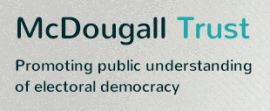 Wednesday 9 November 2016, 13.15
Wednesday 9 November 2016, 13.15
Speaker: Nat le Roux, Strategy Director of the Constitution Society
Chair: tbc
Venue: Robert Runcie Room (basement level), Church House Conference Centre, Dean’s Yard, Westminster, London SW1P 3NZ
Interested colleagues, including research fellows and students, are warmly invited to attend the third in the series of the McDougall Trust’s workshops on topical issues of political representation for 2016. Tea, coffee and biscuits will be available. Please aim to arrive sharp for 13.15 start.
About the topic: There are no clear constitutional principles which govern the circumstances in which a referendum should be held in Britain, or how it should be conducted. In consequence, the referendum is a flexible and powerful political device, which government seems willing to deploy with increasing frequency. A referendum which is ‘advisory’ – rather than post-legislative – is potentially destabilizing in a parliamentary system because it creates an alternative source of democratic legitimacy which arguably empowers government to override or bypass the legislature. As current events seem to demonstrate, the paradox of competing legitimacies is compounded when a referendum seeks a binary answer to a complex question capable of multiple responses. Nat le Roux explores the issue in this highly topical workshop.
About the speaker: Nat le Roux is Strategy Director the Constitution Society, which he co-founded in 2009. He spent most of his earlier career in financial markets and was Chief Executive of IG Group between 2002 and 2006. Amongst other commercial interests, Nat is Chairman of Scotsgold Resources.
Getting there: The main entrance (with steps) to Church House is in Dean’s Yard, Westminster, London SW1P 3NZ. Wheelchair access is available by the Great Smith Street entrance. Location, access and travel details can be found on the Church House website: www.churchhouseconf.co.uk/location
Trust contact point: the Trust’s Administrator, Paul Wilder (telephone: 074 6924 5072 or e-mail: [email protected] or post: Unit W219, Second Floor, West Building, Westminster Business Square, 1-45 Durham Street, London SE11 5JH). Reminders will be sent confirming event details. Do check the website for details of future workshops.
To book a place, please provide the details listed in the box below and send to us as soon as possible at: [email protected] marked ‘Workshop’.
Reminders will be sent confirming event details. Do check the website at: www.mcdougall.org.uk for details of future workshops.
| RESERVATION REQUEST FOR McDOUGALL WORKSHOP: 9 November 2016 |
| Please reserve a place for me: |
| Prefix: Personal names: |
| Institution or organisation: |
| Occupation: |
| Location of main occupation:
(Town / City / County) Postcode: |
| Location of Residence:
(Town / City / County) Postcode: |
| Email address (if not already provided): |
McDougall Trust (charity no. 212151) aims to increase public knowledge and understanding of the operations of electoral democracy, encouraging research and education in political science with particular focus on elections, voting systems, forms of government and representative institutions.
The highly respected specialised library/archive collections in the McDougall Library, incorporating the Lakeman Library for Electoral Studies, are available for consultation by prior arrangement. McDougall publishes the quarterly anonymous-peer-reviewed election studies journal Representation (ISSN 0034-4893).
McDougall aims to reach a wide range of audiences, including policy makers, legislators, election organisers, reformers, campaigners, researchers, academics, pollsters, journalists, commentators, political and social historians, members and officials of institutions and associations that aspire to democracy or use election processes, and all interested in how democratic societies are or could be governed.
